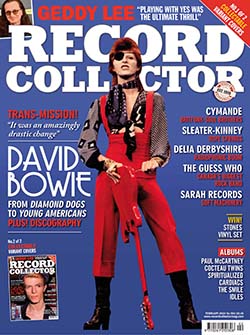
|
What Was I Thinking?” Record Collector Magazine February 2024 by Joel McIver |
have offered fans new insights into this Canadian rock institution and their bassist. Now he answers our questions.
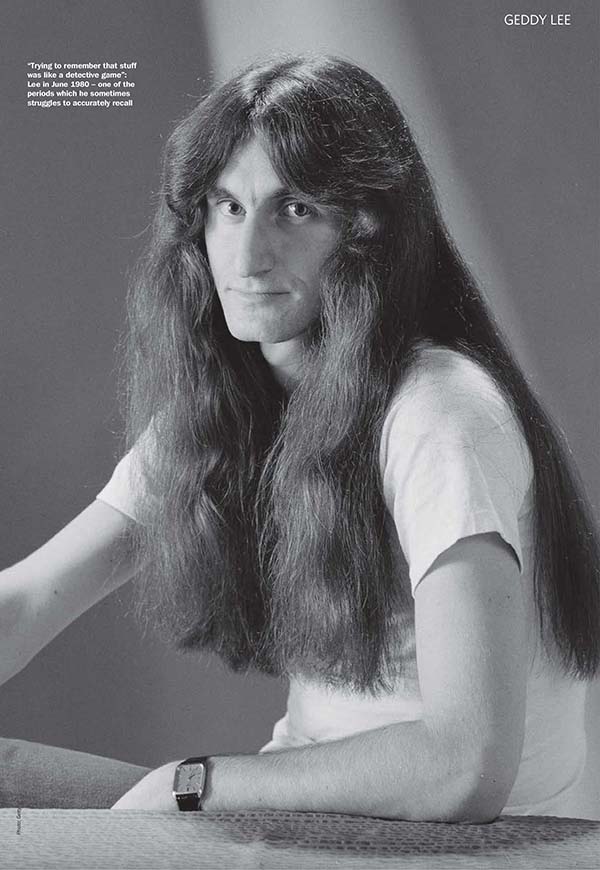
Frontman of the much-missed Rush, child of Holocaust survivors, veteran of
40-plus years in progressive rock, self-confessed germophobe and details
obsessive – and arguably the Greatest Living Canadian – there’s a lot
for Geddy Lee, 70, to talk about. Fortunately, he’s been able to squeeze it all
into his new autobiography, My Effin’ Life, in which he explores the perils
of fame, the pleasures of retirement, and an unexpected dalliance with Peruvian
marching powder. Asked to name Rush’s best album by Joel McIver,
he warns, “Millions of fans are going to disagree with me on this...”
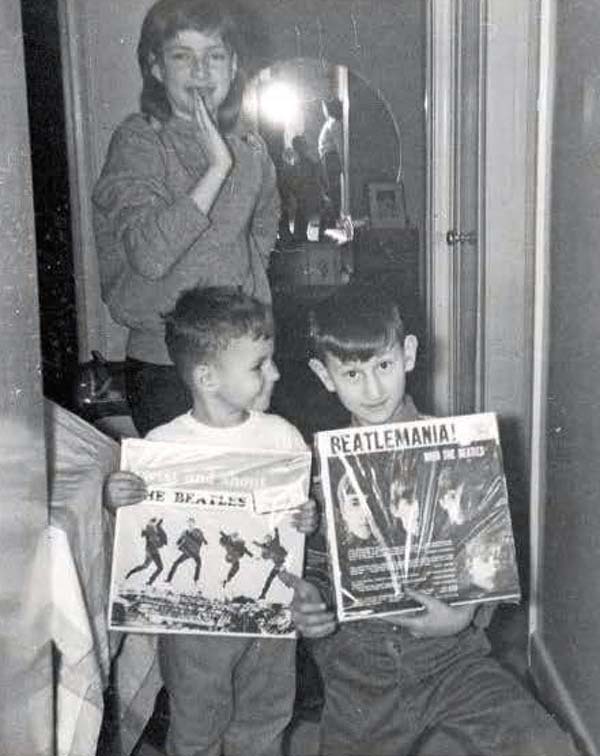 There has never been another band
quite like Rush, who formed in
1968 and blew people’s minds
worldwide for the next 47 years. An
intellectual trio of master musicians
who delivered high-fantasy flights
of fancy in the 70s, ascended synth-and riffheavy
commercial heights in the 80s and
settled neatly into classic rock iconhood in
the 90s, they represented the ultimate
triumph of mind over marketing. With a
very Canadian reputation for polite
eccentricity, the trio – Geddy Lee (vocals,
bass and keyboards), Alex Lifeson (guitar)
and Neil Peart (drums) – should, by rights,
have never made it big, but in fact they
were huge, especially at the triumphant
back end of their careers, when they played
arena tours worldwide.
There has never been another band
quite like Rush, who formed in
1968 and blew people’s minds
worldwide for the next 47 years. An
intellectual trio of master musicians
who delivered high-fantasy flights
of fancy in the 70s, ascended synth-and riffheavy
commercial heights in the 80s and
settled neatly into classic rock iconhood in
the 90s, they represented the ultimate
triumph of mind over marketing. With a
very Canadian reputation for polite
eccentricity, the trio – Geddy Lee (vocals,
bass and keyboards), Alex Lifeson (guitar)
and Neil Peart (drums) – should, by rights,
have never made it big, but in fact they
were huge, especially at the triumphant
back end of their careers, when they played
arena tours worldwide.
If you caught them on one of those
dates, you’ll recall the staggering scale of
both the production and the songs. Even as
a mere trio, Rush made planet-sized music,
with Lee steering the show through their big
hits Tom Sawyer, YYZ, Limelight and The
Spirit Of Radio with a benevolent smile,
uttering batlike vocals of extraordinarily
high frequency: famously, US alt-rockers
Pavement saw fit to discuss his unique pipes
in their 1997 song Stereo.
If you never saw Rush live, you’re out
of luck, because they ceased touring in
2015 and Peart died at the age of 67 five
years later, to the widespread shock and
grief of the group’s enormous fanbase. This
marked the end of Rush as we knew it:
more than just a rock drummer, Peart was a
deep thinker and lyricist who had suffered
the losses of his first wife and daughter,
causing him to step away from Rush from
1998 to 2002.
Lee and Lifeson have essentially been
retired for the best part of a decade now, but
hopes that they would play together again
never went away. This eventually came to
pass in September 2022, when the two
played at the Taylor Hawkins Tribute
Concerts in London and Los Angeles: check
YouTube for the massive reaction from the
crowd – and fellow musicians – at either
event. An earlier, equally enthusiastic
response had greeted Lee when he played
with his heroes Yes in 2017, on the occasion
of their induction into the Rock And Roll
Hall Of Fame.
Still, Lee evidently doesn’t want or need
to be a full-time musician anymore. He has
other matters on his mind, writing The Big
Beautiful Book Of Bass in 2018 and now
publishing a full-blown autobiography, My
Effin’ Life. He’s also a photographer and
wine expert, and clearly has plenty to occupy
himself. Yet still, in the wake of his recent
spoken-word tour, rumours havs spread far
and wide that he and Lifeson may reconnect
for (whisper it) something new from Rush.
Time, RC feels, to ask him some of
the big questions…
Are you pleased with the way My Effin’ Life turned out, Geddy?
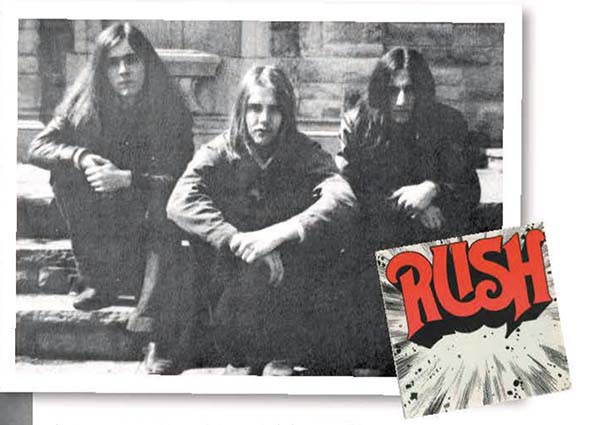 Yeah, I think I am. When I start doing
something, I have a tendency to get a bit
carried away – that seems to be in my
genetic makeup – and I wrote an awful lot
of words: the first version was 1,200 pages.
After we cut it down to a somewhat
reasonable size, although it’s still 500 pages,
I was like, “Holy shit – what was I
thinking? What the fuck was I talking
about in those other 700 pages?”
Yeah, I think I am. When I start doing
something, I have a tendency to get a bit
carried away – that seems to be in my
genetic makeup – and I wrote an awful lot
of words: the first version was 1,200 pages.
After we cut it down to a somewhat
reasonable size, although it’s still 500 pages,
I was like, “Holy shit – what was I
thinking? What the fuck was I talking
about in those other 700 pages?”
And what’s the answer?
I guess you could call it every boring detail
[laughs]. I had stories about my travels, I
had stories about my hobbies and my
indulgences, and a lot more personal
adventures and family stuff. In the end it
was pared back, and rightly so – I have no
problem with that. They did a good job.
You were born Gershon Eliezer Weinrib in Toronto in 1953. Your parents, Moishe and Malka Weinrib, were Polish immigrants who had narrowly survived Auschwitz and Bergen-Belsen as teenagers: you recount their experiences in painful detail in the book. How did you research this period of history?
I took a lot of time over it. I had a lot of tapes
that I had recorded of my mother, particularly
in 1995 when my sister, my brother and I
accompanied her back to Germany for the 50th anniversary of her liberation from Belsen.
We followed up that trip by going to Poland
and visiting her hometown. During that time,
my brother and I were recording her while she
spoke and getting her, while she was in the heat
of the moment, to clarify her stories, because
she did have a tendency to tell the same story
in a few different ways. There were also a
couple of books that I found incredibly
valuable, including Remembering Survival by
Professor Christopher Browning, who talks
about the same phenomenon.
What were the primary challenges there?
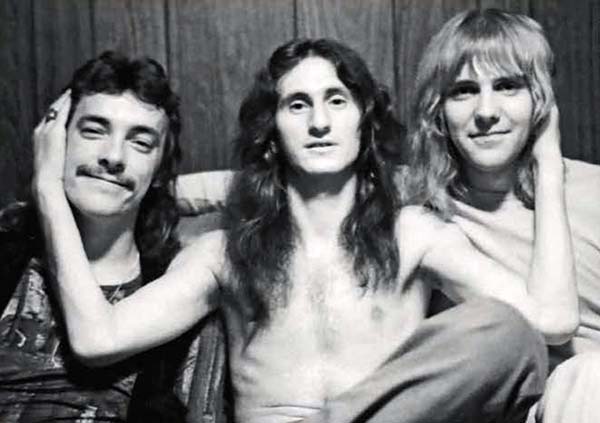 You’re talking about traumatic experiences
that happened to teenagers, and here they are
50 or 60 years later, trying to recall the stories,
and yet they’ve told each other those stories so
many times that the facts kind of
blend. I set about reading a lot of
stories by other survivors, and
there are some very heartfelt and
detailed accounts from the same
village that my mother came
from. There’s also the marvellous
collection of interviews by the
Shoah Foundation. I found
members of my family among
them, amazingly. I was able to
cross-reference a lot of what they
had gone through, so what I
ended up with is pretty close to
the truth, I think. Obviously, I
wasn’t there, so it’s based on the
information I was able to glean
from all these different accounts.
There were some people at the
Polish Museum in Warsaw who offered to
help: they sent some incredible documents,
including my grandfather’s arrest and
deportation warrants. That was just jawdropping.
I wanted to get it right, and I
wanted it to be my telling of their stories, so
I tried to do as much as I could.
You’re talking about traumatic experiences
that happened to teenagers, and here they are
50 or 60 years later, trying to recall the stories,
and yet they’ve told each other those stories so
many times that the facts kind of
blend. I set about reading a lot of
stories by other survivors, and
there are some very heartfelt and
detailed accounts from the same
village that my mother came
from. There’s also the marvellous
collection of interviews by the
Shoah Foundation. I found
members of my family among
them, amazingly. I was able to
cross-reference a lot of what they
had gone through, so what I
ended up with is pretty close to
the truth, I think. Obviously, I
wasn’t there, so it’s based on the
information I was able to glean
from all these different accounts.
There were some people at the
Polish Museum in Warsaw who offered to
help: they sent some incredible documents,
including my grandfather’s arrest and
deportation warrants. That was just jawdropping.
I wanted to get it right, and I
wanted it to be my telling of their stories, so
I tried to do as much as I could.
This sounds like a gruelling experience.
At times it was. I tried to put myself in the
guise of a historian, and to separate myself
from it, even though it was my own family
members. In Professor Browning’s book,
there is a story about the day that the train
left the Polish town of Starachowice for
Auschwitz, and he’s quoting my cousin. I
could not believe it. That was quite a heavy
moment for me – to see my own family there.
Those moments were very
impactful, and writing the
book was both therapeutic
and cathartic.
Your father died in 1965, when you were 12. Given that, it seems foolish to ask if you had a happy childhood.
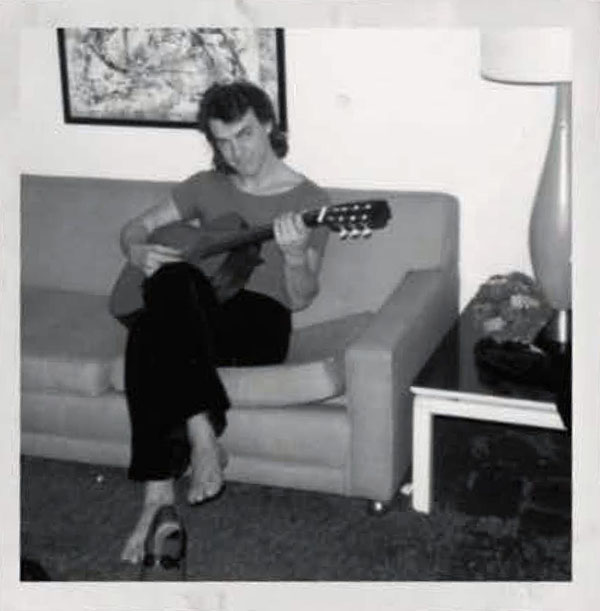 I don’t think I was a
particularly happy child,
although in my very earliest
memories I was fairly happy.
I was a quiet kid, but I did
have a bit of a goofy side.
My brother once showed
me some old film footage
that my dad took, and in
the films, I’m always hogging the camera.
I never thought of myself as such a ham, but
I clearly had a hammy streak. That was
revelatory when I wrote the book, because I’d
always had a mistaken impression of myself as
a child. I thought I was this quiet, nerdy kid,
but time and time again, examining my
actions as a young child and then after my
dad passed away and I got into music, I was
obviously acting with great purpose. That
doesn’t come from a shy, nerdy kid: it comes
from somebody that wants something out of
life. That was a surprise, and I learned a lot
more about myself than I bargained for.
I don’t think I was a
particularly happy child,
although in my very earliest
memories I was fairly happy.
I was a quiet kid, but I did
have a bit of a goofy side.
My brother once showed
me some old film footage
that my dad took, and in
the films, I’m always hogging the camera.
I never thought of myself as such a ham, but
I clearly had a hammy streak. That was
revelatory when I wrote the book, because I’d
always had a mistaken impression of myself as
a child. I thought I was this quiet, nerdy kid,
but time and time again, examining my
actions as a young child and then after my
dad passed away and I got into music, I was
obviously acting with great purpose. That
doesn’t come from a shy, nerdy kid: it comes
from somebody that wants something out of
life. That was a surprise, and I learned a lot
more about myself than I bargained for.
You’ve experienced frequent epiphanies, or moments of acute perception, since childhood. What are they like?
It’s a sudden, acute sense of everything around
you. You’re struck by your own existence. It
feels a little bit surreal, so you ask yourself, “Is
this actually happening, or am I having an
acid flashback?” I’ve always had those in my
life. They’ve been described as moments of
existential angst, and maybe that’s what they
are, or maybe it’s just awareness. Sometimes
you go through your day and you’re thinking
shit and you’re doing stuff, and then you stop
and take everything in. As a kid, these
moments could be very overwhelming.
You joined Rush in 1968, and the fun began in earnest.
Yeah, for sure. The most fun I had writing this
book was dredging up the touring stories about
hanging out with my pals Alex and Neil and
remembering everything we went through. In
particular, talking about the 70s and 80s was a
blast for me. Trying to remember all that stuff
was like a detective game, figuring out where
you were and putting each year back together
in your memory. Some of it just falls out of
memory, so I’d call Alex every once in a while
and say, “Hey Al, do you remember that gig
we did?” or “Do you remember that incident?”
Some things he would remember exactly, and I
could have completely forgotten them.
And then other things, he was a total blank
on. It was a very interesting study on the frailty
of memory.
Is it correct to say that Rush didn’t make any money until 1978?
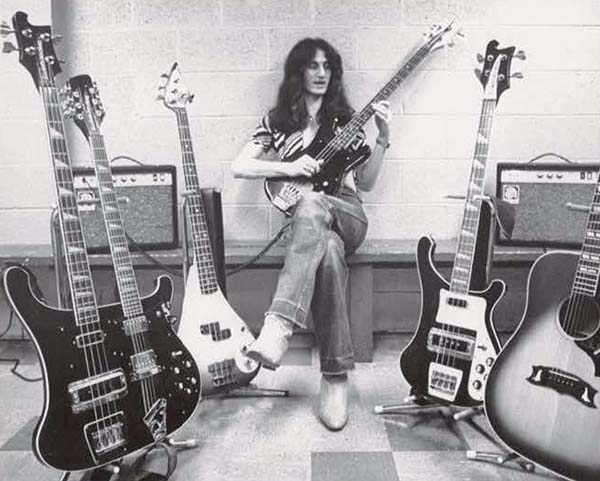 That’s not 100 per cent accurate. We
weren’t skint, and we had homes and nice
cars, but I always say that fame comes long
before profit. Truth be told, we weren’t very
bright when it came to money. We always
wanted to put it back into the show and
make the show better; for example if we
wanted a new crew guy, or if we wanted to
do a new kind of special effect, so we had a
hard time balancing the books in the early
days, for sure.
That’s not 100 per cent accurate. We
weren’t skint, and we had homes and nice
cars, but I always say that fame comes long
before profit. Truth be told, we weren’t very
bright when it came to money. We always
wanted to put it back into the show and
make the show better; for example if we
wanted a new crew guy, or if we wanted to
do a new kind of special effect, so we had a
hard time balancing the books in the early
days, for sure.
In the book, you reveal that you got into cocaine in the 80s. I didn’t expect that.
Yep. Someone else expressed that same
reaction recently, and asked, “Why didn’t
anyone know that?”, which got me thinking.
Because we were a progressive rock band
from Canada that didn’t have any big hit
singles, there was really no journalistic or
pop culture spotlight on us at all. We
plodded along in relative obscurity, in a way.
We had our fanbase, but there were no
journalists that wanted to come and hang
out with us for five days, like we were Led
Zeppelin. There was no sexy lifestyle that
they were attracted to, so we could get
fucked up in private without anybody really
knowing what we were up to. Me and my
buddies, we did like to smoke pot in the
early days, and we did try other things along
the way, including a lot of acid when we
were really young, but we were a part of the
60s drug culture, and we were a product of
that. Some of those drugs got the best of
me, but fortunately we survived them.
Do you still indulge?
No, I don’t do drugs. Wine is my drug now.
Moving Pictures (1981) album was a commercial high-point for Rush, but you didn’t enjoy fame, and you hated it when fans became too obsessed. Did it ever occur to you that you’re too sensible to be a rock star?
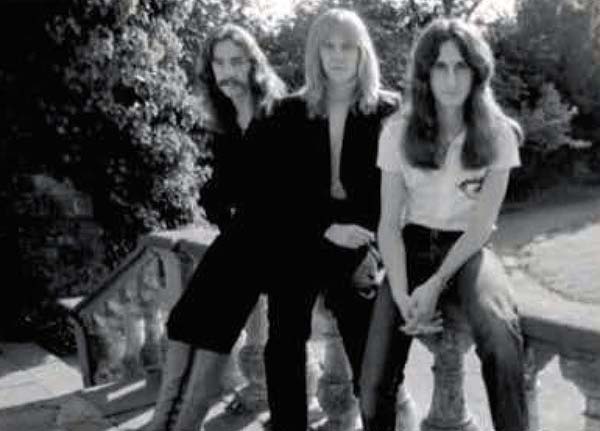 Not in the way that you put it, but there
are things about the lifestyle – now that I’ve
been sitting here for eight years, since our
last tour – that I don’t miss. I don’t miss
the crowd roar... okay, maybe I miss that a
little bit. What I do miss is the job, and
that beautiful moment when you’re playing
well, and you look across the stage and your
partners are playing well, and you’re lost in
that moment. That is the best thing ever.
That’s what I miss.
Not in the way that you put it, but there
are things about the lifestyle – now that I’ve
been sitting here for eight years, since our
last tour – that I don’t miss. I don’t miss
the crowd roar... okay, maybe I miss that a
little bit. What I do miss is the job, and
that beautiful moment when you’re playing
well, and you look across the stage and your
partners are playing well, and you’re lost in
that moment. That is the best thing ever.
That’s what I miss.
There’s a clip on YouTube of Rush playing the 1981 song YYZ in Brazil, and the caption is, “Only this band could make 60,000 fans sing along to an instrumental”.
[laughs] They were amazing! The Brazilians
wrote their own parts. It was incredible. I do
miss that part. The first time that ever
happened was at the Apollo in Glasgow, and
I had chills from that and so did my
partners, I can tell you. So, I’m not going to
say that it’s not a great feeling to be onstage
and have people throwing a lot of love at
you. I would be lying if I said that. But it’s
not something I miss.
You often refer in the book to the band impacting on your marriage. I imagine it’s impossible to be both a touring musician and a present partner or father.
It’s near-impossible, for sure, and there’s
damage, which is usually suffered by someone
other than yourself. I know so many musicians
whose marriages have failed, or come close to
failing, or whose children have been neglected,
and I have guilt about that with my own kids.
Work, and my obsessive nature, means that I
get sucked into it, and I didn’t pay enough
attention to them. That’s something that I’ve
tried to correct over the last 20 years of my life,
and I know that the other guys were also very
aware of that.
There seemed to be a transition point in the early 2000s when Rush relaxed and started having fun, playing giant arenas and having crazy props onstage and so on.
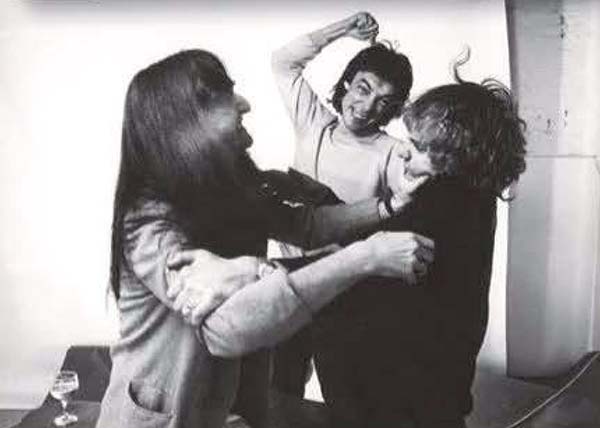 There definitely was. It began with Neil
coming back to the band and touring the
Vapor Trails album in 2002. It felt like a
second lease of life. I never thought Neil would
get through [the losses of his wife and
daughter] and want to play again, but here we
were onstage, after that incredibly difficult
record to make, and the atmosphere felt so
easy. There was an easiness between us and a
clear love between us, and a willingness to not
worry about anything else but playing our
asses off and trying to make each other laugh.
From that point until the end of our career,
that’s all we tried to do. Write well, play well
and make each other laugh.
There definitely was. It began with Neil
coming back to the band and touring the
Vapor Trails album in 2002. It felt like a
second lease of life. I never thought Neil would
get through [the losses of his wife and
daughter] and want to play again, but here we
were onstage, after that incredibly difficult
record to make, and the atmosphere felt so
easy. There was an easiness between us and a
clear love between us, and a willingness to not
worry about anything else but playing our
asses off and trying to make each other laugh.
From that point until the end of our career,
that’s all we tried to do. Write well, play well
and make each other laugh.
As you see it, when was Rush on peak creative form?
I think with the Clockwork Angels album
(2012). Now, millions of fans would
disagree with that [laughs], but I think
there’s a maturity in the writing of that
album that was not possible at any other
time in our history. Some would point
immediately to Moving Pictures and say,
“That was your peak” and there’s an
argument to be made for that, but if you’re
asking me, it’s Clockwork Angels.
Performing with Yes at their Rock And Roll Hall Of Fame induction in 2017 must have felt good.
That was huge thrill for me to do that, I have
to say. It was an odd experience, showing up
to rehearsal and meeting the guys, because
we’d never met before. There were two Yeses
at the time, so it was a bit of an odd scene,
but nonetheless I was welcomed very warmly
and that made me feel great because their
music meant so much to me. Playing [the
1971 Yes hit] Roundabout was just about the
ultimate thrill. I woodshedded for that
moment, I can tell you – I didn’t want to
fuck it up.
Do promoters and other industry people ever suggest that Rush should recruit a new drummer and tour?
Constantly, and I appreciate it. I don’t belittle
it; I don’t dismiss it. When Alex and I played
the Taylor Hawkins Tribute concerts last
year, it was very good for us to do that. It was
nice to play those songs with other people,
and it was no disrespect to Neil at all. Those
songs are us, you know? They were him, but
they were also us, so to retake ownership of
those songs and to not be afraid of that
moment was huge, and very tempting to do
again. Previous to that, I’m not sure I could
make that claim. It was really thanks to the
incredible will and generosity of Dave Grohl,
the most superhuman being on the planet.
He gave us that opportunity: he wanted us
there, and he was so encouraging. He did
everything he could to make it as easy for us
to come back in that context, and he was very
cognisant. I remember having conversations
with him where he’d say, “Well, you can’t
play with just one drummer, because then
they’ll all say that it’s Rush 2.0.” I was like,
“Oh yeah – you’re right, Dave. How about
you be one of the drummers?”
He’d lost both Kurt Cobain and Taylor Hawkins, of course, so perhaps he understands the sensitivities better than most people.
He understands a lot. He’s a caring, sensitive,
incredibly giving person. His encouragement
brought us back to the stage, and it was in
honour of Taylor, of course, and in honour of
our own bandmate and pal Neil, but it was
more than that, and I think he knew that.
The Californian band Primus toured America last year, playing your 1977 album A Farewell To Kings in its entirety. Did you see the show?
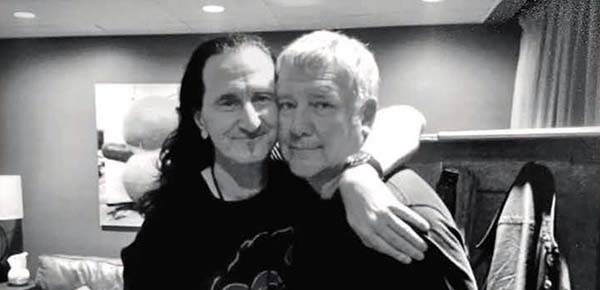 Alex and I went when they came to Toronto
and sat at the side of the stage. It was weird for
us to watch, but suddenly I felt Alex’s hand on
my shoulder: he was proud to see that someone
cared so much about what we’d done that they
were willing to go out and pay tribute to it. It
was very sweet, and we love those guys so much.
They’re such great people and great players –
and it was great hearing Les [Claypool,
bandleader] try to sing my parts. He just did it
as himself, which was absolutely right. He made
it his own.
Alex and I went when they came to Toronto
and sat at the side of the stage. It was weird for
us to watch, but suddenly I felt Alex’s hand on
my shoulder: he was proud to see that someone
cared so much about what we’d done that they
were willing to go out and pay tribute to it. It
was very sweet, and we love those guys so much.
They’re such great people and great players –
and it was great hearing Les [Claypool,
bandleader] try to sing my parts. He just did it
as himself, which was absolutely right. He made
it his own.
You name a lot of people in your book who have either been good to you or have wronged you. Your exact words are, “I am a motherfucker who bears a grudge”. That’s an unusual degree of honesty.
[laughs] Well, that’s good, I guess. When I set
out to write this book, my co-writer Daniel
Richler said to me, “Are there any rules?” I said,
“Only one rule, which is that the only person I
should embarrass is myself.” I didn’t quite stick
to that, because there were a few times that I
could not resist embarrassing someone else, but
for the most part I tried to keep it to people that
impressed me or moved me, or to people I miss,
and the people I’ve lost. I’ve lost a lot of people,
and sometimes I wonder, “Is that normal?”
Sometimes it feels as though I’ve lost an
inordinate amount of people on a regular basis.
Part of the motivation to write is to try and
make sense of all of that to myself.
Have you achieved that goal?
Well, in bits. I think it was good for me.
Reviewing and paying homage to some of
these lost friends was good for me and good
for my heart.
You also mention being obsessed with details. Does that make you difficult to work with?
I don’t think I’m a difficult guy, but that’s me
talking. You’d have to ask the people who are
sitting beside me in the control room. There’s
probably more than one recording engineer
who would beg to differ, but I’ve managed to
remain friends with all the people I’ve worked
with, so I think that must say something about
my ability to be insistent, at times, but not
belittling or unfair. I’ve always put the
project first, not my own self or my own
wishes. Again, Alex might argue with that
from time to time [laughs]. But he still loves
me, so we’re all good.
Do you feel optimistic about the future?
I do, and I don’t think I could have said that
before this book, to be honest. That tells me
a lot about what the process has put me
through. I feel happier today than when I
started to write this book, and you have to
remember, I began it not very long after Neil
passed, so it was a very tough time. But here
we are, at the beginning of 2024, and I do
feel optimistic about the future, and excited
to see what’s around the corner.
Well, that’s the question that everyone will ask you – what’s next?
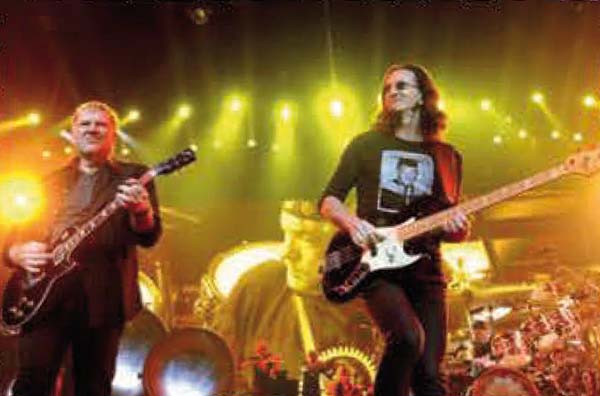 [laughs] Right! I don’t know. One thing I do
know is that I don’t want to plan my life too
far ahead. Another thing is that my life with
my wife comes first, so any other idea –
whether it’s musical or not – is subservient to
those decisions. Would I do a musical
project? Yes, I would. Will I? We’ll see. I’m
up for it, but there’s the task of promoting
this book, and once that’s out of the way, I
think there’ll be a clear view of some musical
endeavour that will draw me back in.
[laughs] Right! I don’t know. One thing I do
know is that I don’t want to plan my life too
far ahead. Another thing is that my life with
my wife comes first, so any other idea –
whether it’s musical or not – is subservient to
those decisions. Would I do a musical
project? Yes, I would. Will I? We’ll see. I’m
up for it, but there’s the task of promoting
this book, and once that’s out of the way, I
think there’ll be a clear view of some musical
endeavour that will draw me back in.
Are you good at doing nothing?
Pretty effin’ good at it [laughs]. I say that, but
my wife would vehemently argue that I’m
never doing nothing, because I’ve always got
a project on the go. I’ve just finished another
little book that I’ll save for another
conversation, and I have so many other ideas
for other types of book. I’m obsessive about
my bird photography: I have two years of
bird photographs that I haven’t sorted
through yet. And then there’s all those bass
guitars that are staring at me very guiltily,
saying, “What the fuck, man? What are we
doing here if you’re not gonna play us?” All
those things are begging for an answer, and I
have to attend to them.
It’s the burden of choice.
Yeah. But it’s kind of wonderful to have
things you want to do, and not all of them are
important in the big scheme of things. You
make them important by deciding that you’re
gonna spend time on them.
In the book, you seem to conclude that music and family are all we really have. Did I interpret that correctly?
You did. At the end of
the day, that’s what you
can hold close to you.
You know those are real.
Everything else seems so
ephemeral.
-| Click HERE for more Rush Biographies and Articles |-

